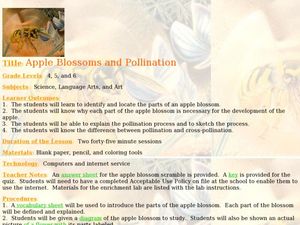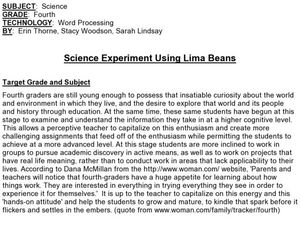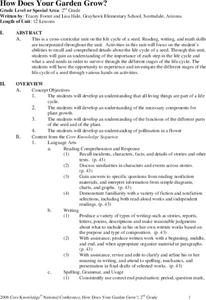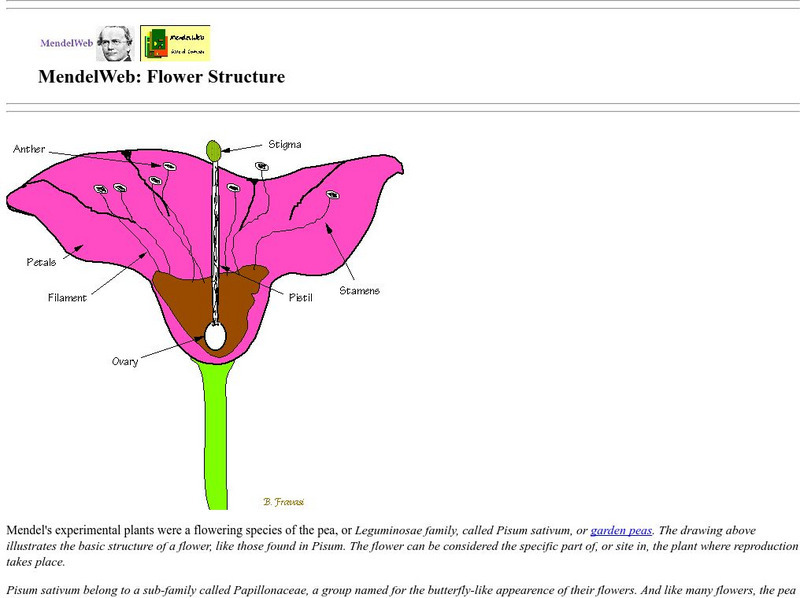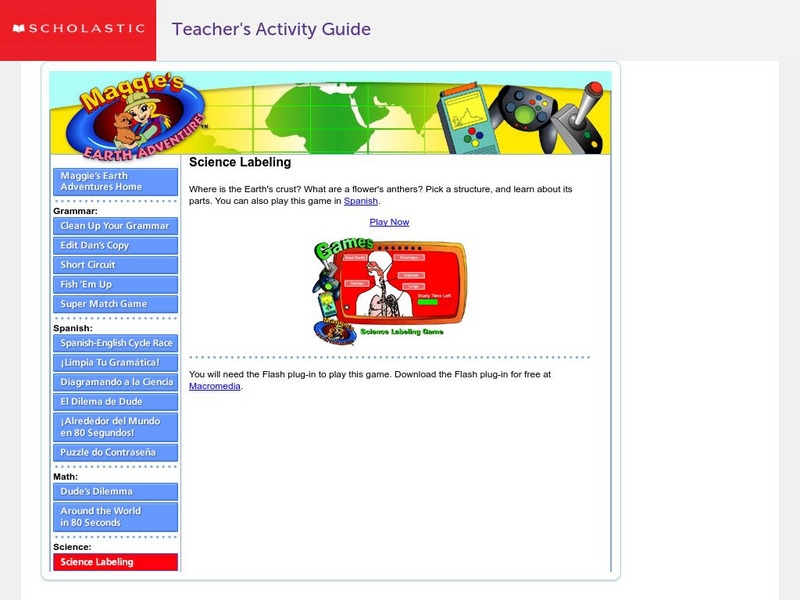Curated OER
The Joy of a Garden-Earth Day
Students explore the purpose of a garden. In this Earth Day lesson plan, students read the story The Gardener and complete a Venn diagram comparing life in a city to farm life. Students discuss Earth Day and plant flowers in a garden .
Curated OER
Life Cycle of Brassica Plants: Planting Seeds
Students explore botany by participating in a calendar class activity. In this plant observation lesson, students examine a diagram of a Brassica plant and identify its anatomy before planting their own seeds and viewing the changes over...
Curated OER
Peanut Anatomy
Students explore the peanut plant. In this peanut lesson, students discuss the needs and parts of regular plants. They research peanut plants to see why they are unique.
Curated OER
Apple Blossoms and Pollination
Learners explore the concept of pollination. In this pollination lesson, students examine the parts of an apple blossom and then compare and contrast pollination and cross-pollination.
Curated OER
Nuts About Peanuts
First graders explore peanuts. In this peanut lesson, 1st graders examine the parts of peanut plants and identify them. Students plant their own peanut plants and chart their growth.
Curated OER
Botany Basics
Students survey plants. In this plant identification lesson, students explore the difference in plants to aid identification. Students determine which plants may be used for medicinal reasons.
Curated OER
Life Cycles
In this plant life cycle activity, students study the diagram of the flower. Students match the term and description that fits each part of the flower.
Bethel School District
Observations and Inference
What's the difference between qualitative and quantitative observations? Learners make observations, inferences, and predictions about their environment with a set of questions and activities that are applicable to either language...
Curated OER
Writing the Essay
Relate the structure of the essay to the structure of a building. The class compares an essay to a building, with the writer being the architect, the introduction being the foundation, and so on. They use the visual representation of a...
Curated OER
Science Experiment Using Lima Beans
Fourth graders tie together elements about the world and their environment. Students incorporate styles of higher order thinking skills. Students measure skills of observations, conclusions, inferences and predictions.
Curated OER
How Does Your Garden Grow?
Students complete activities to learn about the life cycle of a seed. In this plant growth lesson, students complete activities for the life cycles of seeds.
Curated OER
Optional Laboratory: Soil Particle Size and Texture
Students work together to perform experiments on different types of soil. They record the soil's pH level, color and texture. They develop hypothesis' on what they believe they will discover before beginning the experiment.
Science & Plants for Schools
Science & Plants for Schools: Parts of a Flower
A detailed look at the parts of a plant and how plants reproduce.
Missouri Botanical Garden
Missouri Botanical Garden: Biology of Plants: Pollination
Learn the parts of a flower and how a plant gets pollinated. Includes video, songs, diagrams, and lesson plans.
Other
Mendel Web: Flower Structure
This site presents a diagram of flower, followed by a focus on Gregor Mendel's experiments on a flowering species of the pea.
Mocomi & Anibrain Digital Technologies
Mocomi: Parts of a Flower
An illustrated diagram featuring the male and female parts of a flower.
Soft Schools
Soft Schools: Flower Anatomy
Identify the major parts of a flower. Select each part name and drop in the boxes next to the full-color diagram.
Soft Schools
Soft Schools: Plant Parts
Identify the major parts of a plant. Select each part name and drop in the boxes next to the full-color diagram.
Other
Nature's Partners: Pollinators, Plants, and You [Pdf]
Teachers will love this comprehensive Grades 3-6 curriculum on pollinators. There are six modules of detailed plans and accompanying materials. Pre-assessment activities and teacher background information, as well as supplemental...
Scholastic
Scholastic: Science Labelling Game
In a series of five interactive science games, students first study labeled diagrams to learn the names of the Earth's layers, of a flower's parts, of a fish's anatomy, of the human respiratory system, and of layers of the atmosphere....
HotChalk
Hot Chalk: Lesson Plans Page: Plants and Animals
In this lesson plan, young students will be able to identify a plant's parts, explain their functions, diagram a plant, and create a mobile to demonstrate their understanding.





